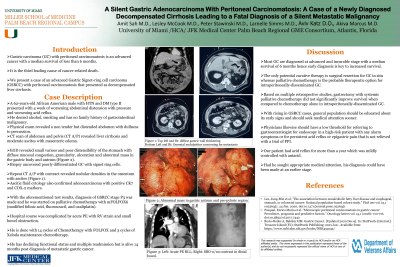Back


Poster Session D - Tuesday Morning
Category: Stomach
D0725 - A Silent Gastric Adenocarcinoma With Peritoneal Carcinomatosis: A Case of a Newly Diagnosed Decompensated Cirrhosis Leading to a Fatal Diagnosis of a Silent Metastatic Malignancy
Tuesday, October 25, 2022
10:00 AM – 12:00 PM ET
Location: Crown Ballroom

Has Audio

Amit Sah, MD
University of Miami/JFK Medical Center
Atlantis, FL
Presenting Author(s)
Amit Sah, MD1, Lesley-Ann G. McCook, MD2, Peter Stawinski, MD1, Larnelle Simms, MD1, Akiva Marcus, MD3
1University of Miami/JFK Medical Center, Atlantis, FL; 2University of Miami/ JFK Medical Center Palm Beach Regional GME Consortium, Atlantis, FL; 3JFK Medical Center, Atlantis, FL
Introduction: Gastric carcinoma (GC) with peritoneal carcinomatosis is an advanced cancer with a median survival of less than 6 months. It is the third leading cause of cancer-related death. We present a case of an advanced Gastric Signet-ring cell carcinoma (GSRCC) with peritoneal carcinomatosis that presented as decompensated liver cirrhosis.
Case Description/Methods: A 62-years-old African American male with HTN and DM type II presented with 4 week of worsening abdominal distension with pressure and worsening acid reflux. He denied alcohol, smoking and has no family history of gastrointestinal malignancy. Physical exam revealed a non tender but distended abdomen with dullness to percussion. CT scan of abdomen and pelvis (CT A/P) revealed liver cirrhosis and moderate ascites with mesenteric edema. EGD revealed small varices and poor distensibility of the stomach with diffuse mucosal congestion, granularity, and ulceration in the gastric body and antrum. Biopsy uncovered poorly differentiated GC with signet ring cells. Ascitic fluid cytology also confirmed adenocarcinoma with positive CK7 and CDX-2 markers. Repeat CT A/P with contract revealed nodular densities in the omentum with ascites. With the aforementioned test results, diagnosis of GSRCC stage P3 was made and he was started on palliative chemotherapy with mFOLFOX6 (modified folinic acid, fluorouracil, and oxaliplatin). He is doing well after 9 months of mFOLFOX6 initiation.
Discussion: Most GC are diagnosed at advanced and incurable stage with a median survival of 6 months hence early diagnosis is key to increased survival. The only potential curative therapy is surgical resection for GC in situ whereas palliative chemotherapy is the probable therapeutic option for intraperitoneally-disseminated GC. Based on multiple retrospective studies, gastrectomy with systemic palliative chemotherapy did not significantly improve survival when compared to chemotherapy alone in intraperitoneally-disseminated GC. With rising in GSRCC cases, general population should be educated about its early signs and should seek medical attention sooner. Physicians likewise should have a low threshold for referring to gastroenterologist for endoscopy in a high-risk patient with any alarm symptoms or for persistent acid reflux or epigastric pain that is not relieved with a trial of PPI. Our patient had acid reflux for more than a year which was mildly controlled with antacid. Had he sought appropriate medical attention, his diagnosis could have been made at an earlier stage.
Disclosures:
Amit Sah, MD1, Lesley-Ann G. McCook, MD2, Peter Stawinski, MD1, Larnelle Simms, MD1, Akiva Marcus, MD3. D0725 - A Silent Gastric Adenocarcinoma With Peritoneal Carcinomatosis: A Case of a Newly Diagnosed Decompensated Cirrhosis Leading to a Fatal Diagnosis of a Silent Metastatic Malignancy, ACG 2022 Annual Scientific Meeting Abstracts. Charlotte, NC: American College of Gastroenterology.
1University of Miami/JFK Medical Center, Atlantis, FL; 2University of Miami/ JFK Medical Center Palm Beach Regional GME Consortium, Atlantis, FL; 3JFK Medical Center, Atlantis, FL
Introduction: Gastric carcinoma (GC) with peritoneal carcinomatosis is an advanced cancer with a median survival of less than 6 months. It is the third leading cause of cancer-related death. We present a case of an advanced Gastric Signet-ring cell carcinoma (GSRCC) with peritoneal carcinomatosis that presented as decompensated liver cirrhosis.
Case Description/Methods: A 62-years-old African American male with HTN and DM type II presented with 4 week of worsening abdominal distension with pressure and worsening acid reflux. He denied alcohol, smoking and has no family history of gastrointestinal malignancy. Physical exam revealed a non tender but distended abdomen with dullness to percussion. CT scan of abdomen and pelvis (CT A/P) revealed liver cirrhosis and moderate ascites with mesenteric edema. EGD revealed small varices and poor distensibility of the stomach with diffuse mucosal congestion, granularity, and ulceration in the gastric body and antrum. Biopsy uncovered poorly differentiated GC with signet ring cells. Ascitic fluid cytology also confirmed adenocarcinoma with positive CK7 and CDX-2 markers. Repeat CT A/P with contract revealed nodular densities in the omentum with ascites. With the aforementioned test results, diagnosis of GSRCC stage P3 was made and he was started on palliative chemotherapy with mFOLFOX6 (modified folinic acid, fluorouracil, and oxaliplatin). He is doing well after 9 months of mFOLFOX6 initiation.
Discussion: Most GC are diagnosed at advanced and incurable stage with a median survival of 6 months hence early diagnosis is key to increased survival. The only potential curative therapy is surgical resection for GC in situ whereas palliative chemotherapy is the probable therapeutic option for intraperitoneally-disseminated GC. Based on multiple retrospective studies, gastrectomy with systemic palliative chemotherapy did not significantly improve survival when compared to chemotherapy alone in intraperitoneally-disseminated GC. With rising in GSRCC cases, general population should be educated about its early signs and should seek medical attention sooner. Physicians likewise should have a low threshold for referring to gastroenterologist for endoscopy in a high-risk patient with any alarm symptoms or for persistent acid reflux or epigastric pain that is not relieved with a trial of PPI. Our patient had acid reflux for more than a year which was mildly controlled with antacid. Had he sought appropriate medical attention, his diagnosis could have been made at an earlier stage.
Disclosures:
Amit Sah indicated no relevant financial relationships.
Lesley-Ann McCook indicated no relevant financial relationships.
Peter Stawinski indicated no relevant financial relationships.
Larnelle Simms indicated no relevant financial relationships.
Akiva Marcus indicated no relevant financial relationships.
Amit Sah, MD1, Lesley-Ann G. McCook, MD2, Peter Stawinski, MD1, Larnelle Simms, MD1, Akiva Marcus, MD3. D0725 - A Silent Gastric Adenocarcinoma With Peritoneal Carcinomatosis: A Case of a Newly Diagnosed Decompensated Cirrhosis Leading to a Fatal Diagnosis of a Silent Metastatic Malignancy, ACG 2022 Annual Scientific Meeting Abstracts. Charlotte, NC: American College of Gastroenterology.
